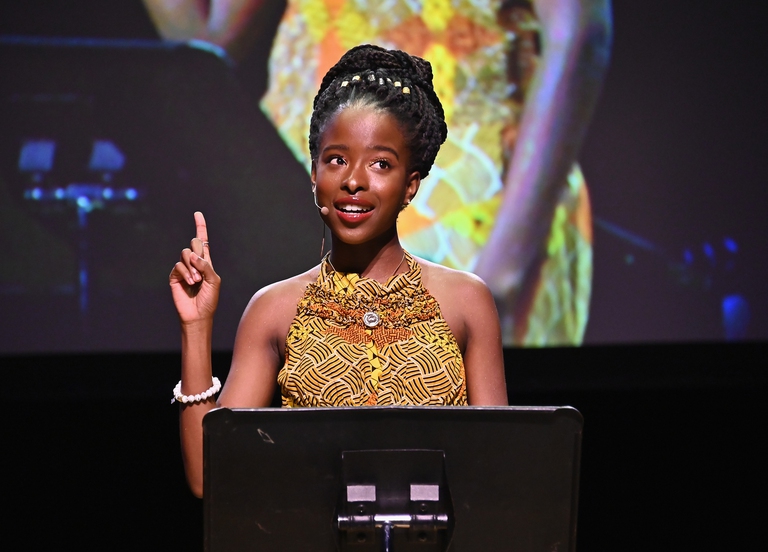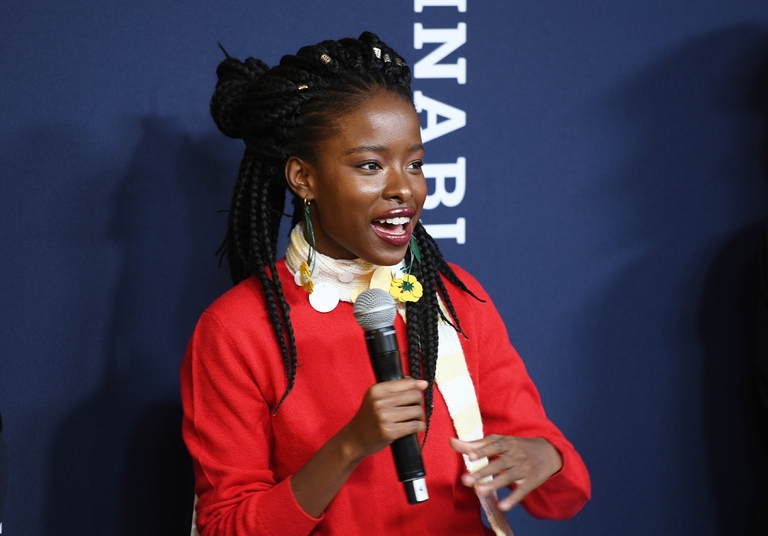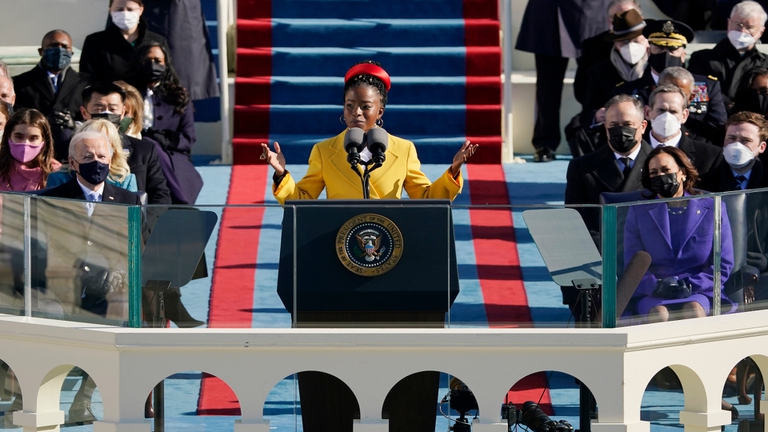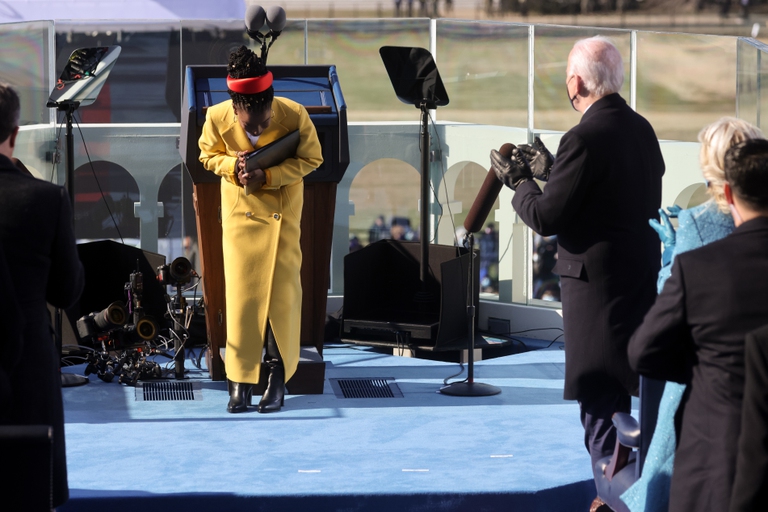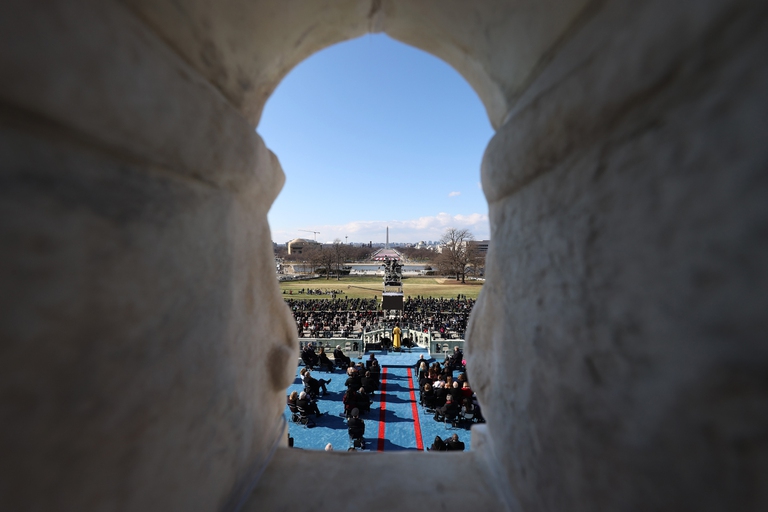
Kyoto’s premier photography festival, Kyotographie, grows in stature with the launch of a new music festival, Kyotophonie, held in the spring and autumn.
“For there is always light, if only we’re brave enough to see it”. Meet Amanda Gorman, the young Black poet who capitvated hearts at Biden’s inauguration.
Last month, a 22-year-old Black poet and activist received a video call. In times like these, when the safest way to meet is through a screen, this sentence feels perfectly normal. The caller, however, wasn’t an ordinary person but a member of (at the time) president-elect Joe Biden’s staff. Having seen the young poet perform in the Library of Congress, first lady Jill Biden thought she would be the right person to write a poem to be read during the inauguration ceremony to be held on the 20th of January. This is the how Amanda Gorman became the youngest poet ever to take part in a presidential inauguration.
Gorman was born in 1998 at “an incredibly odd intersection in Los Angeles,” as she stated it in a New York Times interview: “It felt like the black ’hood met black elegance met white gentrification met Latin culture met wetlands”. She attended a private school in Malibu and lived in an apartment with her mother, Joan Wicks, and brothers. As a child, Gorman often felt like an outsider and spent most of elementary school convinced she was an alien. “Literally”. While her mother might have described her as a precocious child, she thought she was just “plain weird”. Gorman enjoyed spending her days on a bench writing in her diary or building up her vocabulary, while other children played or spent their days watching television – which was forbidden in Gorman’s household. Young Amanda wanted to read everything, discover everything, do everything.
Gorman always had a penchant for writing, which was easier to her than speaking, seeing as she couldn’t pronounce certain sounds, which caused her great shame. Nevertheless, she found her voice thanks to Toni Morrison’s books, thanks to which she realised that even a girl with skin as dark as hers can be the hero of a story. By writing, she became the protagonist of her own story: a young Black girl who isn’t ashamed of anything and who knows what it means to be silenced. One-of-a-kind.
Gorman made a promise to herself, that she would never stop writing, never stop telling stories about the lives of the marginalised people. In her first years of high school, she decided to trying and get her work published, taking part in free poetry workshops at Beyond Baroque and non-profit WriteGirl. In 2017, she was awarded the title of National Youth Poet Laureate, and it will come as no surprise that she also studied at Harvard, where she graduated cum laude in sociology. And then came the 20th of January 2021, a day Gorman is likely to remember for a long time.
In that fateful call, Gorman was given neither precise guidelines nor limitations as to what she could write, as long as the theme was a united America – a concept she herself profoundly believes in. So she started her research by rereading and rewatching speeches by great American leaders such as Martin Luther King Jr., and even getting in touch with other poets who participated in past presidential inaugurations. With just over two weeks to go, she was feeling exhausted and scared – like anyone in her position would be – of not being up to the task. She tried to write a few lines each day, knowing this was the best way forward. Then, on the 6th of January, a group of to Trump supporters seemingly lost their minds and stormed the Capitol. Gorman stayed up late that night, deciding that she wouldn’t omit the day’s events from her poem.
We’ve seen a force that would shatter our nation rather than share it.
Would destroy our country if it meant delaying democracy.
This effort very nearly succeeded.
But while democracy can be periodically delayed,
it can never be permanently defeated.
With inauguration day drawing closer, Gorman put the finishing touches on her poem, “The Hill We Climb”. She read it over and over again to prepare for the moment she would join a club including the likes of Robert Frost, Maya Angelou, Elizabeth Alexander and Richard Blanco, who all put their hands on that lectern during inaugurations past. For five minutes the world held its breath, enchanted by the words of a young woman telling her story, her origins rooted in African American slavery, the story of a country that has suffered but knows how to rise again through unity. Like a phoenix reborn from the ashes.
As Gorman’s poem ended – after she took us through her hopes, her dreams of the future that could be and her invitation to believe in this future – the internet went crazy. Millions of people shared her words, some choosing one verse, some another. Many had tears in their eyes, others couldn’t stop smiling. A great many people started searching for copies of her book, which, however, won’t be published until September in the United States (by Viking Books) under the same name as the poem that has made Gorman into a household name.
For a little while, on the 20th of January Gorman made the sun shine brighter on Washington D.C.
When day comes, we step out of the shade, aflame and unafraid.
The new dawn blooms as we free it.
For there is always light,
if only we’re brave enough to see it.
If only we’re brave enough to be it.
When day comes, we ask ourselves where can we find light in this never-ending shade?
The loss we carry, a sea we must wade.
We’ve braved the belly of the beast.
We’ve learned that quiet isn’t always peace,
and the norms and notions of what “just” is isn’t always justice.
And yet, the dawn is ours before we knew it.
Somehow we do it.
Somehow we’ve weathered and witnessed a nation that isn’t broken,
but simply unfinished.
We, the successors of a country and a time where a skinny black girl descended from slaves and raised by a single mother can dream of becoming president, only to find herself reciting for one.
And yes, we are far from polished, far from pristine,
but that doesn’t mean we are striving to form a union that is perfect.
We are striving to forge our union with purpose.
To compose a country committed to all cultures, colours, characters, and conditions of man.
And so we lift our gazes not to what stands between us, but what stands before us.
We close the divide because we know, to put our future first, we must first put our differences aside.
We lay down our arms so we can reach out our arms to one another.
We seek harm to none and harmony for all.
Let the globe, if nothing else, say this is true:
That even as we grieved, we grew.
That even as we hurt, we hoped.
That even as we tired, we tried.
That we’ll forever be tied together, victorious.
Not because we will never again know defeat, but because we will never again sow division.
Scripture tells us to envision that everyone shall sit under their own vine and fig tree and no one shall make them afraid.
If we’re to live up to our own time, then victory won’t lie in the blade, but in all the bridges we’ve made.
That is the promise to glade, the hill we climb, if only we dare.
It’s because being American is more than a pride we inherit.
It’s the past we step into and how we repair it.
We’ve seen a force that would shatter our nation rather than share it.
Would destroy our country if it meant delaying democracy.
This effort very nearly succeeded.
But while democracy can be periodically delayed,
it can never be permanently defeated.
In this truth, in this faith, we trust,
for while we have our eyes on the future, history has its eyes on us.
This is the era of just redemption.
We feared it at its inception.
We did not feel prepared to be the heirs of such a terrifying hour,
but within it, we found the power to author a new chapter, to offer hope and laughter to ourselves.
So while once we asked, ‘How could we possibly prevail over catastrophe?’ now we assert, ‘How could catastrophe possibly prevail over us?’
We will not march back to what was, but move to what shall be:
A country that is bruised but whole, benevolent but bold, fierce and free.
We will not be turned around or interrupted by intimidation because we know our inaction and inertia will be the inheritance of the next generation.
Our blunders become their burdens.
But one thing is certain:
If we merge mercy with might, and might with right, then love becomes our legacy and change, our children’s birthright.
So let us leave behind a country better than the one we were left.
With every breath from my bronze-pounded chest, we will raise this wounded world into a wondrous one.
We will rise from the golden hills of the west.
We will rise from the wind-swept north-east where our forefathers first realised revolution.
We will rise from the lake-rimmed cities of the midwestern states.
We will rise from the sun-baked south.
We will rebuild, reconcile, and recover.
In every known nook of our nation, in every corner called our country,
our people, diverse and beautiful, will emerge, battered and beautiful.
When day comes, we step out of the shade, aflame and unafraid.
The new dawn blooms as we free it.
For there is always light,
if only we’re brave enough to see it.
If only we’re brave enough to be it.
Siamo anche su WhatsApp. Segui il canale ufficiale LifeGate per restare aggiornata, aggiornato sulle ultime notizie e sulle nostre attività.
![]()
Quest'opera è distribuita con Licenza Creative Commons Attribuzione - Non commerciale - Non opere derivate 4.0 Internazionale.
Kyoto’s premier photography festival, Kyotographie, grows in stature with the launch of a new music festival, Kyotophonie, held in the spring and autumn.
The small state of Mizoram in northeast India has a thriving handicraft industry, with artisans making a living by selling products made from bamboo.
Many British cultural institutions have ended their relationship with oil giant BP in recent years, thanks to pressure from activists and the public.
Communities across India are celebrating Durga Puja, a festival that stands as an example of the communal unity which is under threat in the country .
Through stories of encounters between humans and animals, Our Wild Calling offers a way out of an age of solitude. We speak to author Richard Louv.
Survival, multiculturalism, plastic islands. Musician Grey Filastine recounts his adventure aboard the Arka Kinari, which set sail in 2019 and spent much of last year adrift in the Pacific because of the pandemic.
Chinese filmmaker Chloé Zhao made history, becoming the first Asian woman to win an Academy Award as well as a Golden Globe for Best Director for Nomadland.
A list of some of the best films on ethical and sustainable fashion shown at past editions of the Milan Fashion Film Festival.
The winner of the 2020 FTP Prize for Sustainable Art, created to highlight the need for environmental awareness in contemporary art, has been announced.
